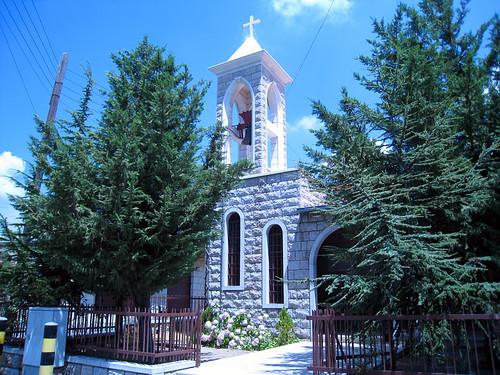Many decades ago, a lot of Armenians, escaping the humidity in Beirut, used to spend their Summer in the mountain villages, renting houses in villages like Mrouj, Bolognia, Dhour-Shweir, Mtein. During the war, the number of families spending their Summer in the villages have declined. However, recently there is a return to the villages and the number of Armenian families in these villages has been increasing during the Summer. Two ladies, Ms. Vartoug Balekjian and Ms. Ani Baboghlanian, serving members in the Armenian Evangelical Emmanuel Church, had the vision to start Sunday church services in Mrouj during the Summer. In order to receive further information about their initiative, which continues for the third year now, we had an interview with them.
Note: the Summer services in Mrouj will start on Sunday, 10 July 2011 and end on Sunday, 25 September 2011.
(Interview by Raffi)
Note: the Summer services in Mrouj will start on Sunday, 10 July 2011 and end on Sunday, 25 September 2011.
(Interview by Raffi)

The Arab Evangelical Church in Mrouj, where the Armenian Evangelical Worship services are held during the Summer
Raffi - What is the need that you saw in Mrouj, for which you worked to have church services there?
Vartoug & Ani - Basically, it started in response to a personal need. As you know the village is about 45 minutes from Beirut, and to go down to attend a worship service at our Church meant giving at least three hours of Sunday mornings. So, to go down on a Sunday, proved to be time consuming and on many days simply impossible, because we had to leave behind guests, and most of our guests would like to visit us during the week ends. Of course there is an Evangelical church in Mrouj in itself and some others in nearby villages, but they are not in Armenian.
Raffi - What steps did you take to start implementing this vision?
Vartoug & Ani - The first step was to share the concern among ourselves, we mean those who practically live in Mrouj during the summer months. Then Ani, who is a member of the Church board, raised the issue at one of their meetings. The idea of having worship service was soon adopted by the church board. Then she contacted Mr. Edward Kharrat, an elder in the Mrouj evangelical church and asked for permission to use the church premises for Armenian worship after their service on Sunday morning. After getting the permission, brochures and posters were prepared and the children in our families helped distribute them to the shops and Armenian families to announce the start of the services.
Raffi - Who participates in the Sunday services and how many attend from the Armenian families in Mrouj?
Vartoug & Ani - There are around ten families, members of which attend regularly. Then are some Armenian families from the neighboring villages who attend more or less regularly. An average number of 30 persons attend the services; some days it is far above that number, on others it is far less!
Raffi - What are the difficulties that you faced?
Vartoug & Ani - A major difficulty was music. The local church did not use the piano they had. So, we had to bring an expert to tune it. Then came the difficulty of finding a piano player each Sunday. Another difficulty was task distribution. There were times when one person carried the whole burden – except that of preaching.
Raffi - How do you see the response of the Armenian Evangelical churches and the Arab Evangelical church to this initiative?
Vartoug & Ani - The local church was more than happy to lend the church hall for Armenian Evangelical worship service. As for the response of the Armenian Evangelical Churches – no direct comments reached us, but all those- and by those we mean pastors and lay people alike- who were approached and asked to lead a service, or preach , or play the piano from different Armenian Evangelical churches, were positive and eager to respond. We are thankful for them all.
Raffi - What are the long term plans?
Vartoug & Ani - The big vision. Well, how big do you want us to make our vision? We would like to see the Armenian Evangelical church, that is half-built in Mrouj, to be completed, so that full church activities could be carried on there in summers; like Sunday school, ladies’ meetings, junior & youth meetings, Bible studies and prayer meetings. A closer vision would be to see more people who live in Mrouj in summers attend these services.

The Armenian Evangelical Church in Mrouj, which was left half-built after the war started in the 70s.

